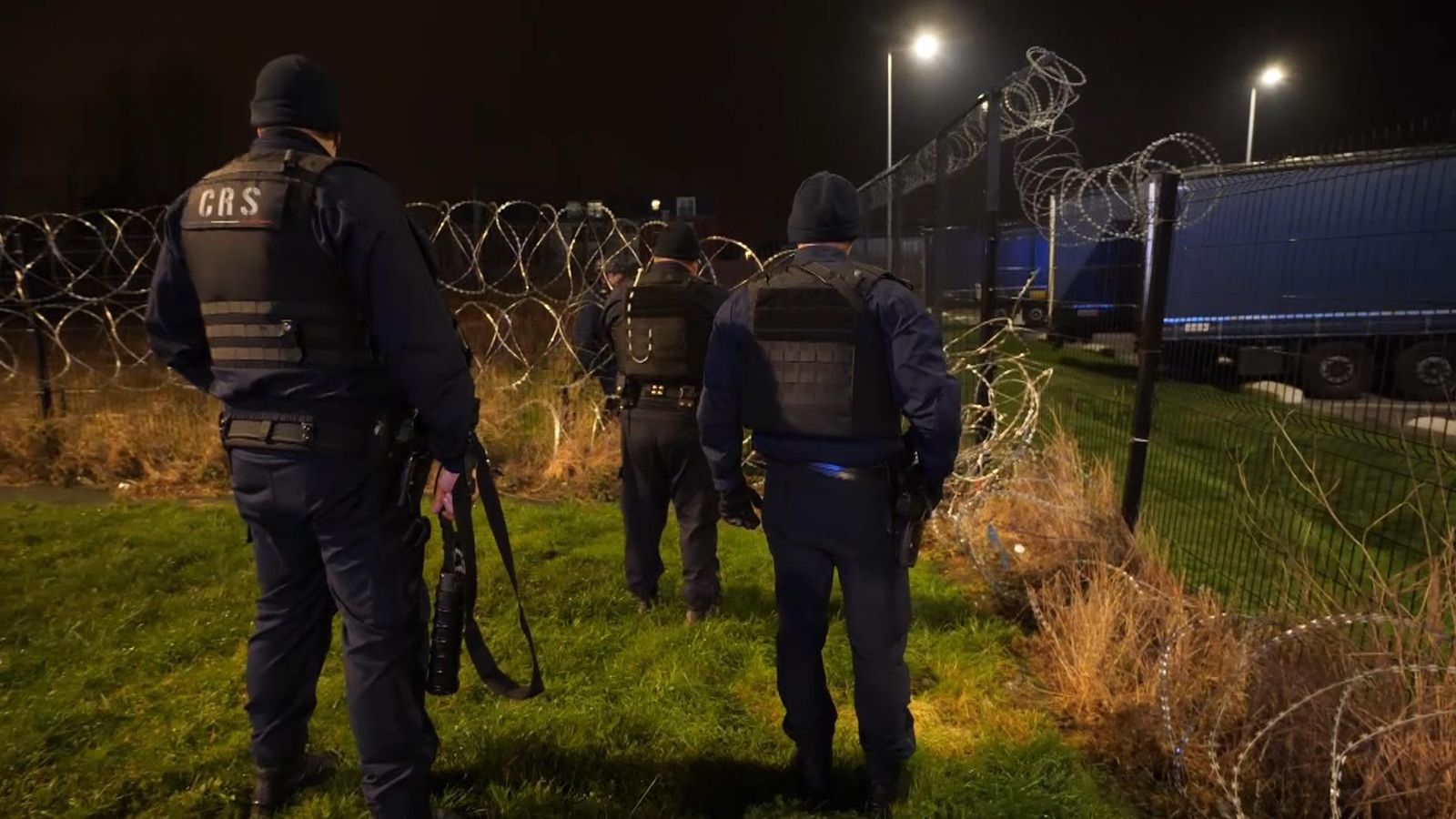It is the early hours of the morning, but this corner of Calais is busy, just as it always is.
At first, you don’t notice many of the people. Sure, you see the blue flashing lights, the police vans speeding around and the articulated lorries driving in and out. But in the shadows and the gloom, there are hundreds of people milling around, all waiting to try to hitch a lift to Britain.
You see them as flashes of action. A lorry slows as it goes round a roundabout and suddenly there is a man sprinting alongside it. He reaches out his hands but can’t quite pull himself up. The lorry speeds up again; the man slows up and walks away.
And so it happens again and again. Young men crouch in the shadows and then run out to try to pull themselves up on to a vehicle. Mostly they fail, and skulk away. Sometimes they pull themselves on, but are spotted by drivers, who come to an angry halt.
But occasionally they succeed. We watched one person, with a blend of audacity, agility and athleticism, run alongside a lorry, jump up and then pull himself into the space between cab and trailer.
It is extremely dangerous. Just recently, a teenager was killed after falling beneath the wheels of a lorry, the latest in a line of fatalities. But for the people who throng around this area, the risk is worth the potential reward. All these people are trying to get to Britain.
Crossing the Channel in a boat involves paying a people smuggler, which can cost thousands of pounds, as well as the significant chance that the boat will be overloaded, sink, break down or simply not turn up.
Channel crossings: Little girl carried in man’s arms among first arrivals to UK this year
Migrant crossings: 2021 marks record year with more than 28,300 people entering UK via English Channel
Channel deaths: Devastated families hold funerals in Iraq for some migrants who died in English Channel crossing
Attempting to stow away on a lorry, by contrast, is free, and the supply of suitable transport is more predictable. The lorry parks of Calais are full of vehicles crossing the Channel every day. The challenge is firstly to get on board, and then to evade detection.
Neither is easy, which is why people often spend months on end attempting to get to Britain this way. And that’s why, on this cold, dark night, the police are playing a cat and mouse game with all these migrants.
When a police van arrives in one place, the men go somewhere else and wait for the van to move on. No sooner has it left than the men return. It is a pattern that you see again and again.
Even when they are caught on the back of lorries, the police’s powers to detain would-be stowaways are limited. Very rarely do even the most aggrieved of lorry drivers want to press charges. By and large, the drivers just want to get on with their journey.
So lorry drivers, migrants and police officers find themselves in an elaborate night-time choreography. A battle of wits and experience.
Those running after the lorries are powered by hope, ambition and desperation. But for many of the police, it is weary work. Rarely do they speak to journalists but on this occasion, we strike up conversations with a group of officers from a unit of the CRS, the French force that specialises in controlling crowds and dealing with public disorder.
“It is like this every day,” says Henri (that’s not his real name), who’s been coming to Calais for many years. “Every day, every day. I’ve seen everything. In fact, I’ve seen everything twice.”
We are standing by the roadside, next to a hole in a security fence. He gently grabs my shoulder and points at a silhouette of a man in the distance. “Look there. There he is. He’s waiting for us to go. And as soon as we do, then he’ll be back here.
“There is no reason for any of these people to be here except to try to get on to a lorry. It’s the only thing they want to do.”
I ask if it’s changing at all and he nods. “Yes, for four or five months, it’s been getting worse.”
What complicates his job is that none of these people even want to be in his country. “They want to go to Britain, to become legal and then I think lots of these people want to go to America,” he tells me. “I talk to them. I even say ‘what’s wrong with France?’ They say they think they are not welcome here. They all want to go to Britain – to England – and America.”
Migrant crossings: 2021 marks record year with more 28,000 people entering UK via English Channel
We spend some time with Henri and his team. They visit a lorry park, and find that a fence has been pulled down, even though it is topped with ferocious razor wire. The unit hunts for any people who might have got in, but can’t see anyone. Either they’ve fled, or they’re concealed inside a vehicle.
Further down the road, another apparently sturdy fence has been ripped open. Henri reckons it would cost two or three thousand euros to repair “and it will be open again within a few days”.
They fire tear gas to disperse a group of men who are gathering alongside a road, waiting to jump on a vehicle. Later that evening, another group throws branches on to a motorway to try to slow lorries enough to give them the chance to leap aboard. Three police vans rush to the scene; the cat reacting to the mice.
It’s not always about athletic endeavour, of course. Plenty of lorries have suffered smashed locks or torn sides, the signs of an unwanted visitor in a trailer. Drivers check their vehicles thoroughly, knowing they face a fine of up to £2,000 for every person they may inadvertently bring into Britain.
And even if a person does manage to avoid detection by the driver, a stowaway might well be caught by security checks at the port. Frankly, you have to be very lucky to get away with it, but some people do.
That’s what inspires the ones left behind; the ones queuing up at the roundabout to take a run at the next passing lorry. “I don’t think it will ever stop,” says Henri, as he prepares to go off shift. He’ll be back tomorrow night, ready to face the same people, in the same place, doing the same thing.






















